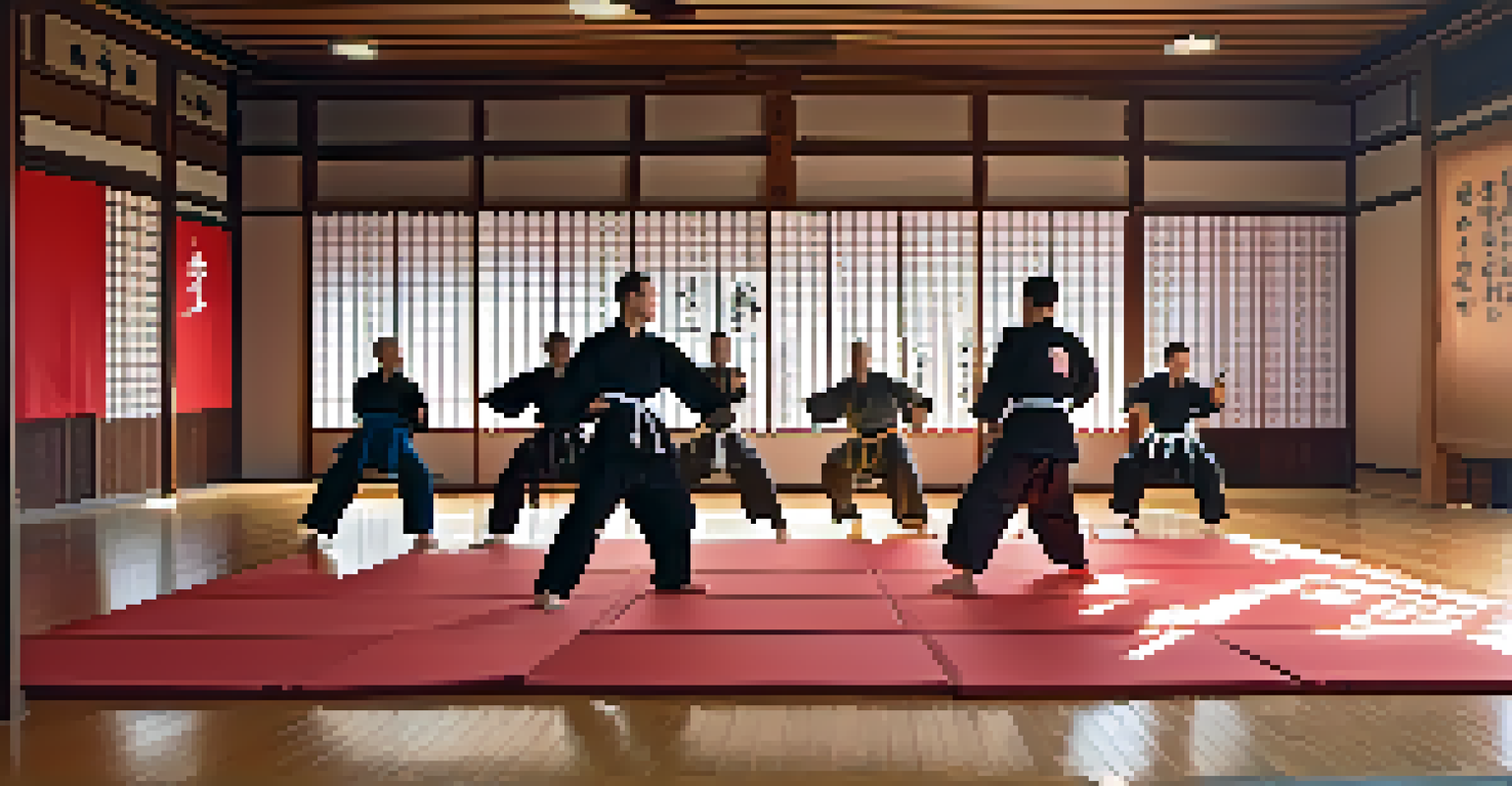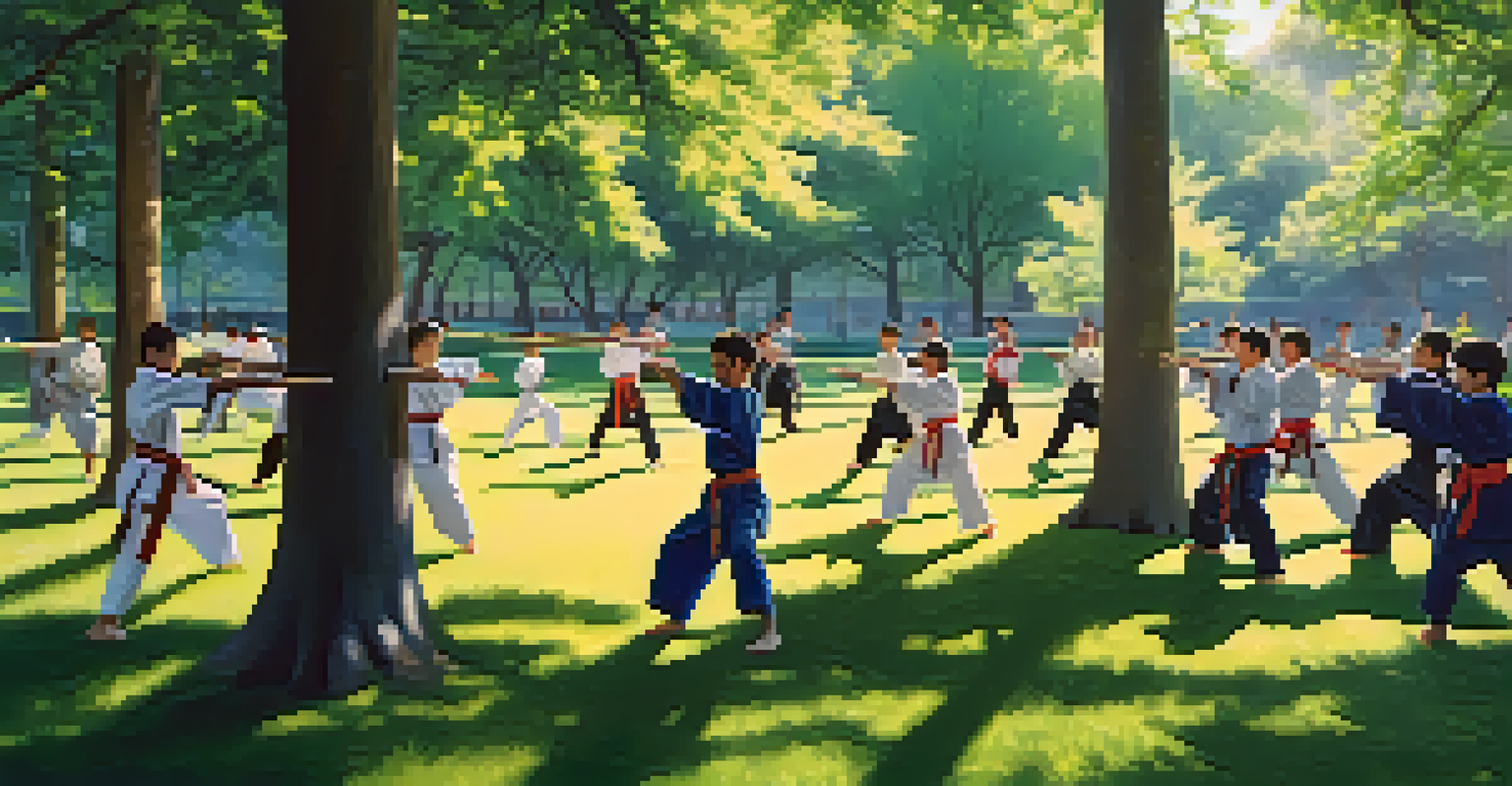Martial Arts as a Tool for Promoting Physical Activity

Understanding Martial Arts and Its Appeal
Martial arts are not just about fighting; they encompass various disciplines that promote both physical and mental well-being. From karate to judo, each form offers unique techniques and philosophies that attract practitioners. The appeal lies in their dynamic nature, which combines discipline, skill, and fitness, making them an exciting way to stay active.
Martial arts are a way of life, a discipline that can improve both body and mind.
Many people find martial arts more engaging than traditional workouts like running or gym sessions. This engagement comes from the sense of community found in dojos and training classes, where individuals share a common goal of improving their skills. The camaraderie often transforms a solitary activity into a fun, social experience, encouraging consistent participation.
Moreover, martial arts foster a growth mindset. Practitioners learn to set goals, whether it’s mastering a new technique or earning a belt promotion, which keeps them motivated. This focus on continuous improvement makes martial arts an excellent avenue for promoting a lifelong love of physical activity.
Physical Benefits of Practicing Martial Arts
Engaging in martial arts offers a comprehensive workout that builds strength, flexibility, and endurance. Techniques often involve a mix of high-intensity movements, which can significantly improve cardiovascular health. Additionally, the various stances and forms practiced help enhance balance and coordination, making daily activities easier.

Many martial arts also incorporate strength training through bodyweight exercises like push-ups, squats, and kicks. These functional movements help develop muscle tone and core strength, essential for overall fitness. Because martial arts training often involves sparring and drills, practitioners can burn a considerable number of calories while having fun.
Martial Arts Boosts Physical Fitness
Practicing martial arts provides a comprehensive workout that enhances strength, flexibility, and cardiovascular health.
Importantly, martial arts aren’t limited to younger audiences. People of all ages can benefit from these practices. Many studios offer classes specifically designed for different age groups, allowing everyone to engage in a suitable physical activity that keeps them fit and active throughout their lives.
Mental Health Benefits of Martial Arts
Beyond physical fitness, martial arts also provide significant mental health benefits. The focus required during training can serve as a form of mindfulness, helping practitioners clear their minds and reduce stress. This mental clarity can lead to improved focus and productivity in other areas of life.
The journey of a thousand miles begins with one step.
Additionally, martial arts often emphasize respect, discipline, and perseverance. These core values can help build self-esteem and confidence, which are crucial for navigating life's challenges. As individuals master techniques and progress through ranks, they experience a sense of accomplishment that boosts their overall mental resilience.
The supportive environment of martial arts training can also help combat feelings of isolation. Practitioners often form strong bonds with their peers, creating a sense of belonging that enhances emotional well-being. This community aspect is a powerful motivator for maintaining a regular physical activity routine.
Martial Arts for All Ages and Skill Levels
One of the most appealing aspects of martial arts is their accessibility. Classes are available for all ages and skill levels, making it easy for anyone to join. From children learning basic self-defense to adults seeking a new hobby, there’s a place for everyone in the martial arts community.
Many martial arts schools offer introductory classes that allow newcomers to experience different styles without a long-term commitment. This flexibility encourages individuals to try out various disciplines, such as taekwondo, Brazilian jiu-jitsu, or kickboxing, until they find the one that resonates with them.
Mental Health Benefits of Training
Martial arts training promotes mindfulness, self-esteem, and resilience, contributing positively to mental well-being.
Moreover, martial arts training can be adapted to suit individual needs or limitations. Instructors are usually trained to modify techniques for different fitness levels, ensuring that everyone can participate safely. This inclusive approach makes martial arts a fantastic option for promoting physical activity among diverse populations.
Building Discipline and Consistency through Martial Arts
Practicing martial arts instills a sense of discipline that can extend beyond the dojo. Regular training schedules require commitment and consistency, which can help individuals develop better time management skills. This discipline often translates to other aspects of life, encouraging healthier habits and routines.
As practitioners work toward their goals, whether it’s earning a new belt or perfecting a technique, they learn the importance of perseverance. This journey can teach valuable life lessons about dedication and hard work, reinforcing the idea that progress takes time and effort.
The structured nature of martial arts classes, with clear progression paths, keeps participants engaged and motivated. This commitment to regular practice can lead to lifelong habits of physical activity, making martial arts a sustainable choice for fitness.
Social Connections Fostered by Martial Arts
Joining a martial arts class opens the door to a vibrant community. Practitioners often train together, share experiences, and celebrate each other’s successes, forming strong social bonds. These connections can make the training experience more enjoyable and fulfilling.
Group classes also provide a sense of accountability. When you train with others, there’s a natural encouragement to show up and give your best effort. This collective spirit can motivate individuals to push their limits and stay committed to their fitness goals.
Inclusive for All Ages and Levels
Martial arts classes cater to all ages and skill levels, making it accessible for everyone to join and benefit.
Additionally, many martial arts schools hold events, competitions, and seminars that further enhance community ties. Participating in these activities not only strengthens skills but also allows practitioners to meet others who share their passion for martial arts, enriching their social lives.
Promoting Lifelong Fitness through Martial Arts
Incorporating martial arts into your life can pave the way for lifelong fitness. As individuals develop skills and confidence, they are more likely to continue engaging in physical activity. The sense of achievement from progressing in martial arts can inspire a commitment to staying active.
Moreover, martial arts teach self-defense skills, which can empower practitioners to feel safer in their environments. This newfound confidence can encourage more outdoor activities, like hiking or biking, further enhancing overall health.

Ultimately, martial arts offer a holistic approach to fitness that combines physical, mental, and social elements. By embracing martial arts, individuals can cultivate a sustainable, enjoyable lifestyle that prioritizes health and well-being for years to come.